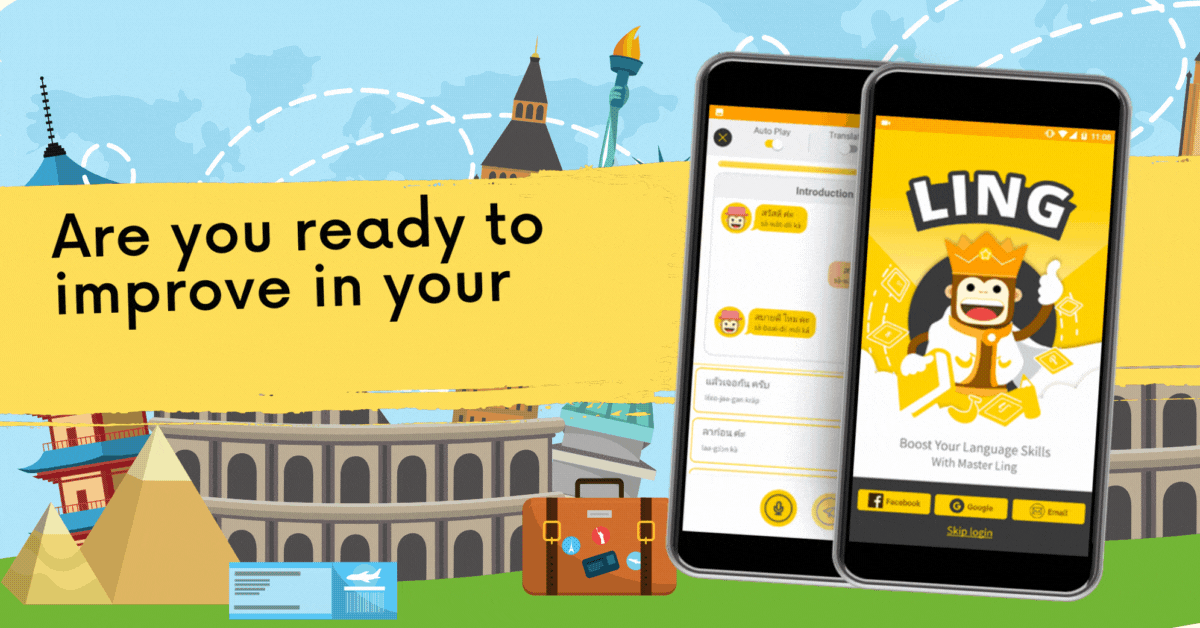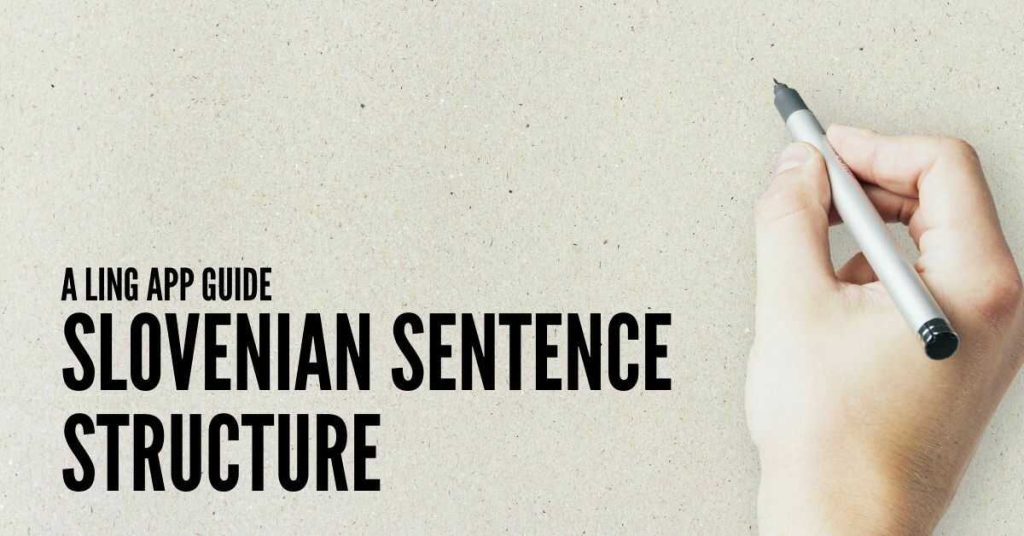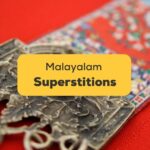Ready to learn the Slovenian language but don’t know where to start from? Worry no more! We brought you an epic blog post about Slovenian sentence structure in which we will give you an idea about how to form a basic sentence in the Slovenian Language. In this blog, we will provide you with adequate vocabulary and walk you through grammar rules which you can learn to make a Slovene sentence. If you are up for that, then let the learning begin!
Slavic Languages

SLOVENIAN SENTENCE STRUCTURE
SUBJECT-VERB-OBJECT ORDER
Slavic languages are the languages that are mainly spoken by the Slavic people. There are three main categories in Slavic/ Slavonic languages: East, South, and West. This group of languages constitutes more than 20 languages and one of those languages is Slovenian. Slovenian belongs to the south Slavic subgroup of Slavic languages.
Slavic languages share countless similarities in terms of the alphabets used (consonants and vowels), pronunciations (palatalization, etc.), and sentence structures. There are various details in these languages which might differ but the basics share similar structures.
Slovenian Sentence Structure
A basic sentence in Slovenian has a subject-verb-object structure. However, it is important to know that the subject in the Slovene language is not extremely important and the verb can be enough to explain what the subject is due to the unique conjugation of each verb.
Subject
Subject refers to the noun which the entire sentence is about. It is the main component of any sentence. To understand and study the subjects in the Slovenian language, it is important to first understand them in the English language.
Example
For instance, in the sentence “I am a girl”, the word/ noun “I” is the subject of the sentence since the entire sentence is about “I”.
Subject in a Slovene sentence is written at the start of the sentence. Unlike many languages e.g Korean, there is no subject marker present. Also, the subject is not conjugated in any way. The most commonly used subjects in Slovene are nouns. The Slovene word for the subject is “osebek”.
Nouns
Nouns refer to the words thus indicating the name of a thing, place, animal. The word for a noun in Slovene is “samostalnik”. They can be both proper nouns (significant; written in title case) or common nouns (written in small letters).
Here is a table for you to learn Slovene nouns to make a sentence.
| Proper Nouns | Common Nouns |
| Osnovna Šola (Name Of A School) | Šola (School) |
| Ljubljana (Name Of The Capital Of Slovenia) | Oči (Eyes) |
| Mladinska Knjiga (Name Of A Publishing House) | Knjiga (Book) |
| Franc (Name Of A Person) | Vrečko (Bage) |
| Kovačič (A Surname) | Mati (Mother) |
| Julijske Alpe (Name Of A Mountain Range) | Vreme (Weather) |
| Piran (Name Of A Town) | Oseba (Person) |
| Cerkev Marijinega Oznanjenja (Name Of A Church) | Cerkev (Church) |
| Bolnišnica Valdoltra (Name Of A Hospital) | Bolnišnica (Hospital) |
| Univerza V Mariboru Rektorat (Name Of A University) | Univerza (University) |
Pronouns
Pronouns are words that can be used instead of nouns. For instance; he, she, it, they, my. There are different types of pronouns in Slovenian (personal, negative, interrogative, etc.). In this blog, we will teach you personal pronouns and possessive pronouns only to keep it simple.
Here is a table of Slovene pronouns for you to learn and to make a sentence.
| Personal Pronouns | Possessive Pronouns |
| Jaz (I) | Moj (My) |
| Ti (You) | Tvoj (Your) |
| Mi (We) | Naš (Our) |
| On (He) | Njegovo (His) |
| Ona (She) | Njo (Her) |
| To (It) | Njegovo (Its) |
| Oni (They) | Njihov (Their) |
Verb
Verbs refer to the action words in any sentence. The verbs provide a connection between the subject and the object. The verb refers to the action that is being imposed on the subject. An object is always influenced by a subject and the verb indicates why or how.
Example
For instance, in a sentence (I eat food), eat is the “verb” connecting “I” and “food”.
Verbs in Slovenian conjugate based on the subject that they follow. For each noun, the conjugation of the verb changes.
| Slovenskih Glagolov (Slovene Verbs) | Translation |
| Pisati | Write |
| Upati | Hope |
| Govoriti | Talk |
| Odgovoriti | Answer |
| Misliti | Think |
| Poslušati | Listen |
| Hoditi | Walk |
| Jesti | Eat |
| Izgovoriti | Pronounced |
| Priti | Come |
Adjective
Adjectives refer to the words which describe the quality of a certain noun. In Slovenian sentences, the adjectives are used to provide a description of the subject used.
Here is a table of Slovene adjectives which can be used to make sentences.
| Adjectives | Translation |
| Počasi | Slow |
| Hitro | Fast |
| Novo | New |
| Mehko | Soft |
| Grobo | Rough |
| Majhna | Small |
| Živ | Alive |
| Umetno | Artificial |
| Dobro | Good |
| Bad | Slab |
Object
The Slovene word for the object is “predmet”. The objects are present at the end of the sentence. This is the last part of basic word order. The object is the word/ noun which the subject is usually acting upon. Object refers to the noun that the subject is putting the action on. In basic Slovenian sentence structures, the objects are placed after the subjects and the verbs.
Example
For instance, in an English sentence (I hit you) “you” is an object since the subject “I” performs the action on “you”, thus becoming the object.
Subject Verb Object Order
In Subject Verb Object Slovenian sentence structure, the sentence starts with the subject, then the verb is placed to provide a connection between subject and object, and then the object on which subject is putting the action is placed.
Here is a table using subject, verbs, and objects for you to understand these sentences better.
| Stavki (Sentence) | Subject | Verbs | Object |
| Jaz Jem Sendvič (I Eat Sandwich) | Jaz (I) | Jem (I Eat) | Sendvič |
| Ti Ješ JabolkoYou Eat Apple) | Ti (You) | Ješ (You Eat) | Jabolko (Apple) |
| Mi Jemo Pica (We Eat Pizza) | Mi (We) | Jemo (We Eat) | Pica (Pizza) |
| On Pije Sok(He Drinks Juice) | On (He) | Pije (He/ She/ It Drinks) | Sok (Juice) |
| Ona Pije Čaj (She Drinks Tea) | Ona (She) | Pije (He/ She/ It Drinks) | Čaj (Tea) |
| To Pije Kava(It Drinks Coffee) | To (It) | Pije (He/ She/ It Drinks) | Kava (Coffee) |
| Oni Pijejo Water(Theydrink Water) | Oni (They) | Pijejo (They Drink) | Vodo (Water) |
Subject Verb
In this order, the sentence is formed by combining a subject and a verb only. This type of sentence usually lacks an object. Here is a table of examples using personal nouns and verbs for you to understand these sentences better.
| Stavki (Sentence) | Subject | Verbs |
| Jaz Jem | Jaz (I) | Jem (I Eat) |
| Ti Ješ | Ti (You) | Ješ (You Eat) |
| Mi Jemo | Mi (We) | Jemo (We Eat) |
| On Pije | On (He) | Pije (He/ She/ It Drinks) |
| Ona Pije | Ona (She) | Pije (He/ She/ It Drinks) |
| To Pije | To (It) | Pije (He/ She/ It Drinks) |
| Oni Pijejo | Oni (They) | Pijejo (They Drink) |
Subject Adjective
Certain sentences have an SA order (Subject Adjective) order. In this type of word order, the subject is being followed by an adjective with a connecting word between them.
Here is a table for you to get a better idea about such sentences;
| Stavki (Sentence) | Subject | Connecting Word | Adjective |
| Mati Je Pametna (Mother Is Smart) | Mati (Mother) | Je (Is) | Pametna (Smart) |
| Sneg Je Bel (Snow Is White) | Sneg (Snow) | Je (Is) | Bel (White) |
| Oči So Lepe (Eyes Are Beautiful) | Oči (Eyes) | So (Are) | Lepe (Beautiful) |
| Nebo Je Modro(Sky Is Blue) | Nebo (Sky) | Je (Is) | Modro (Blue) |
| Mačka Je SramežljivaCat Is Shy) | Mačka (Cat) | Je (Is) | Sramežljiva (Shy) |
| Življenje Je Kratko(Life Is Short) | Življenje (Life) | Je (Is) | Kratko (Short) |
| Pot Je Dolga (Road Is Long) | Pot (Road) | Je (Is) | Dolga (Long) |
| Svetloba Je Svetla (Light Is Bright) | Svetloba (Light) | Je (Is) | Svetla (Bright) |
| Delo Je Dobro (Job Is Good) | Delo (Job) | Je (Is) | Dobro (Good) |
| Torba Je Polna (Bag Is Full) | Torba (Bag) | Je (Is) | Polna (Full) |
Positive Sentences
Positive sentences refer to the sentences which provide a positive answer for a question or provide a positive sentence in general. These are the sentences that are aligned with the thing asked in the question. Such sentences are usually marked with the word “yes” in the starting. The word for yes in Slovenian is “ja” or “da”.
Example
For the question “Si naredil domačo nalogo?” (Did you do your homework?), the positive Slovene answer will be “Ja, naredil sem domačo nalogo” (Yes, I did my homework).
The examples mentioned in the tables above were of positive sentences. Refer to Tables 5, 6, and 7.
Negative Sentences
Negative sentences refer to sentences that are negative in nature. Such sentences provide a negative answer for a question or provide a negative sentence in general. Such sentences usually start with the word “no” which is “ne” in Slovene.
Example
For the question “Si naredil domačo nalogo?” (Did you do your homework?), the positive Slovene answer will be “Ne, nisem naredil domače naloge” (No, I did not do my homework).
The basic word order of negative sentences in the Slovenian language is Subject+no+verb. Here is a table explaining how to make negative statements;
| Negative Statements | Subject | Ne (No) | Verb |
| On Ne Mara (He Doesn’t Like) | On (He) | Ne (No) | Mara (Like) |
| On Ne Pije (He Doesn’t Drink) | On (He) | Ne (No) | Pije (Drink) |
| Jaz Ne Vohunim (I Don’t Spy) | Jaz (I) | Ne (No) | Vohunim (Spy) |
| Jaz Ne Jočem (I Don’t Cry) | Jaz (I) | Ne (No) | Jočem (Cry) |
| On Ne Odgovarja (He Doesn’t Answer) | On (He) | Ne (No) | Odgovarja (Answer) |
| On Ne Ve (He Doesn’t Know) | On (He) | Ne (No) | Ve (Know) |
| On Ne Poje (He Doesn’t Eat) | On (He) | Ne (No) | Poje (Eat) |
| Oni Ne Tečejo (They Don’t Run) | Oni (They) | Ne (No) | Tečejo (Run) |
| Ona Ne Piše (She Doesn’t Write) | Ona (She) | Ne (No) | Piše (Write) |
| On Ne Spi (He Doesn’t Sleep) | On (He) | Ne (No) | Spi (Sleep) |
Questions/ Interrogative Sentences
Question sentences refer to the interrogative sentences which are written to ask something from someone. These questions should always have a question mark (?) at the end.
There are several question words that are used to make the questions in the Slovenian language. There are two words for where, which, and how. “kje” and “kam” are used to ask where, “kako” and “kakšen” are used to ask how, and “kateri” and “kakšen” are used to ask which.
Like in English, in a question sentence, first the question word is placed and the thing which the question is about follows afterward.
Here is a table using the question words in the Slovenian language to make interrogative sentences.
| Question Sentences | Question Word | Translation |
| Kam Želiš Iti? (Where Do You Want To Go?) | Kam | Where |
| Katero Knjigo Želite? (Which Book Do You Want?) | Katero | Which |
| Kako Ti Je Ime? (What Is Your Name?) | Kako | What |
| Kdo Je On? (Who Is He?) | Kdo | Who |
| Zakaj Si Žalosten? (Why Are You Sad?) | Zakaj | Why |
| Čigava Knjiga Je To? (Whose Book Is This?) | Čigava | Whose |
| Koga Imaš Rad? (Whom Do You Like?) | Koga | Whom |
Tip Of The Day!
Many Slovene learners get confused between the word Slovene and the word Slovenian. Both sound similar and therefore often used wrong by the people. The word Slovenian is an adjective while the word Slovene is a noun. For a long time, there has been a debate on how to use it. However, in modern times, this difference has ended and people use these terms interchangeably. Both the terms coexist in today’s world and are widely used.

Wrapping Up
That’s it for this blog. If you liked this post and had a lot to learn then feel free to check out other blogs by the Ling app. If you want free lessons about spoken language learning or blogs about languages in general, keep visiting the Ling app’s blogs. We provide blogs and tutorials in almost all languages.
If Slovenian is not your first language and you are interested in learning more about Slovenian, then make sure to visit Ling app by Simya Solutions. We have also uploaded blogs on Slovenian Numbers and the Slovenian alphabet. If you want to learn the sentence structures in other languages then feel free to go through the website. For instance, we have created blogs for you on the sentence structure of the Korean language and sentence structure of the Irish language with many other simple sentences.
Happy learning!





















